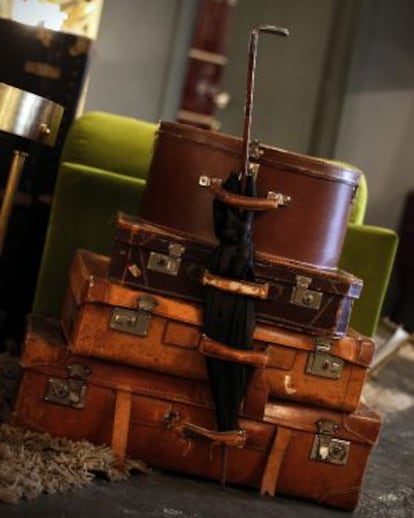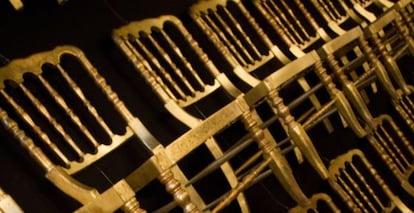Antiques are out, vintage is in
From the Rastro Sunday flea market to the smart Las Letras neighborhood, tastes in furniture and decoration are changing in the Spanish capital

Over the course of the last century or so, Madrid's Rastro has become one of Europe's best-known flea markets: on Sunday mornings its myriad stalls spread out into surrounding side streets, attracting hordes of tourists. Less visited by the sightseers are the antique dealers and second-hand furniture shops that line this pleasant, tree-lined street, whose real name is Ribera de Curtidores.
Like shopkeepers and business owners throughout Spain, the men and women who run these shops say that the crisis is hitting them hard.
The signs of recession are visible in a number of establishments - many of which have been here for decades. In the Plaza del General Vara del Rey, the heart of the Rastro, Solís is up for rent; Palacios is in the midst of a closing-down sale; and G. Ayala is available to buy. Their owners are retiring, saying the good years are over, at least for them. It is not just the recession that is prompting traditional antique and second-hand furniture dealers to shut up shop on the Rastro: tastes are changing. Antiques are out; vintage is in.
Madrid's vintage trendsetters
- L. A. Studio. Calle Arganzuela, 8. www.lastudio.es
- La Brocanterie. Calle Rodríguez de Guevara, 2. www.labrocanterie.es
- La Europea. Calle General Vara del Rey, 11. www.laeuropea.es
- El Ocho. Calle Mira el Río Alta, 8.
- Modernario. Calle Santa María, 20. www.modernario.es
- Passage Privé. Calle San Pedro, 8. www.passageprive.es
- Amapola. Calle Amor de Dios, 11. www.amapoladecoracion.com
For example, La Europea or La Recova, which specialize in art deco and early-to-mid-20th-century furniture, have no intention of closing down. Eugenia, who, along with her partner Sonia, runs La Europea, says that while business is not exactly brisk, they will survive. "We are keeping our heads above water, but the crisis has hit our clientele. We are still selling, but mainly smaller items," she says.
The pair set up the business eight years ago. "It was great fun: we hired a van and went around Europe buying things that weren't available in Spain, and pricing them for a younger, but not necessarily affluent, clientele," says Eugenia. Their formula for weathering the recession has been copied by other shopkeepers nearby, for example, La Brocanterie, tucked away next to the neighborhood's Evangelist church.
A little further along the street is an old-style barber's shop whose owner restores picture frames, a modern-art gallery, and a shop that at first glance seems to belong to another era, complete with a calendar featuring 1980s topless model Samantha Fox. Among the items on sale are an industrial lamp and a vast 1950s armchair rescued from a doctor's waiting room. The owner, Francisco, says that this is the kind of eclectic mix that sells. "I'm never going to be a millionaire, but we've been here for two years now, and we're still hanging in there. The reason we survive is because our customers are impulsive... and moneyed." He goes on to tell the story of the day that the business really took off: "Paco León, the actor, was in here one day: he loves the kind of things we sell, and he bumped into [fashion designer] John Galliano. He took a photo of him, and that was that."
The people who run these shops say that the crisis is hitting them hard
A couple of streets away another antique dealer is about to throw in the towel. "After 30 years I'm finished," says Fernando García, surrounded by his collection of bronze busts and porcelain - unlikely to appeal to the likes of fashion designer Galliano. Nearby, another establishment, this time filled with floridly framed paintings, is equally void of customers. The owner, Pombo, in his sixties and with the fatalistic air of a man who knows when his time has come, says he too has had enough: "I'm selling everything off cheap. Things are terrible. I'm retiring, because this is over. It's not just the crisis: we are obsolete.
"My kids like stuff from New York, and that's fine. But look at this painting of a bullfighter's suit of lights. I bought it in a bar in Cádiz for 1,200 euros thinking it was a bargain: I couldn't give it away." Pombo says that he accepts the change, but what he misses is the cut and thrust of the old days. "The other shopkeepers, the card games, buying and selling, sometimes you made a killing..."
I'm never going to be a millionaire, but we've been here for two years now"
Carlos López, the owner of L.A. Studio, grew up in the trade: "My grandparents were specialists in furniture from the 14th to 16th centuries; my parents, the 18th and 19th; and my specialty is the 20th century." He says he saw the change in tastes coming. "I used to travel around the international trade fairs and saw there how things were developing," he says, sat among a selection of mainly art deco pieces in his 700-square-meter showroom.
Carlos says that he has survived by expanding into other areas: he doesn't just sell furniture, he rents out fixtures and fittings to film and television production companies, as well as to events organizers and photography studios.

"You have to diversify, take risks," says his partner Adelino. "The market is close to saturation, so you have to specialize in certain things, become known for a certain look. In our case this has meant avoiding Scandinavian stuff, which is very popular, and instead going for furniture from the 1940s to the 1960s. Top quality stuff, pieces with a bit of history. Obviously we buy everything abroad: nothing interesting was produced in Spain from the 1930s on."
A million miles from L.A. Studio in terms of style is Modernario, located in Madrid's more upmarket Las Letras neighborhood, near the Prado Museum. Owner Julio Montero Melchor opened Modernario seven years ago, specializing in Scandinavian furniture from the first half of the last century. "It's taken a long time to get going: Madrid taste is still very classical. We have had to really teach people about this concept," says Montero, pointing to a bookshelf filled with weighty tomes that he uses to illustrate and explain the virtues of Nordic design to potential customers.
I'm selling everything off cheap. I'm retiring, because this is over"
Modernario is a much more modest proposition than L.A. Studio and filled, it has to be said, with some lovely pieces of furniture. "We started with Scandinavian design; not because it was fashionable, but because of the quality," says Montero. He started out with Danish work, slowly introducing some Italian work - "more sophisticated, in better condition." He then decided to specialize in pieces designed by some of the key figures of the 20th century, such as Hans Wegner, Gio Ponti, or Angelo Lelli. "That was a great moment in European creativity, involving not just cabinet makers, but engineers, scientists..." says Montero, a man clearly passionate about his profession. He picks out a Niels Møller chair: "Look at it: it looks like a branch; it's built according to anthropometric criteria. In those days, furniture building was a team effort."
Las Letras, which has long been home to a number of upmarket antiques dealers on nearby Prado street has, in recent years, attracted a growing number of traders selling furniture and fixings from the mid-twentieth century.
"The mood in this area is very different to the Rastro: it's much quieter," says Montero. He's happy to have competition, saying that the area now attracts more passersby and is becoming known. "A lot of shops have opened recently, selling a range of stuff of varying quality, but we have a very clear identity; people know what to expect when they come in, and that is the important thing," he says.
The market is close to saturation; you have to specialize in certain things"
A few streets away, Nuria Quillis and Luis Bermejo offer a different take on vintage. Passage Privé is a former dairy filled with Playmobil pieces, along with a dog who comes up to visitors in search of petting. "We don't specialize in furniture. We offer a complete styling concept based on pieces from the early 20th century right up to the 1980s. Most of it is recycled or eclectic - industrial, office furniture, objects," says Quillis.
Objects? "Yes, those objects that awaken feelings of nostalgia, like Lego signs, or tennis rackets, which we transform into mirrors, or boxes into chests of drawers," explains Quillis.
Like all her colleagues in Madrid's burgeoning vintage movement, she believes that the key to survival is offering unique pieces targeted at a clearly defined clientele. "I would not define my customers as bohemian bourgeois, or advertising types, or actors... I see them more as people with a modern touch. Maybe they are low-wagers looking for a piece to make a difference in an apartment filled with IKEA furniture."
Tu suscripción se está usando en otro dispositivo
¿Quieres añadir otro usuario a tu suscripción?
Si continúas leyendo en este dispositivo, no se podrá leer en el otro.
FlechaTu suscripción se está usando en otro dispositivo y solo puedes acceder a EL PAÍS desde un dispositivo a la vez.
Si quieres compartir tu cuenta, cambia tu suscripción a la modalidad Premium, así podrás añadir otro usuario. Cada uno accederá con su propia cuenta de email, lo que os permitirá personalizar vuestra experiencia en EL PAÍS.
¿Tienes una suscripción de empresa? Accede aquí para contratar más cuentas.
En el caso de no saber quién está usando tu cuenta, te recomendamos cambiar tu contraseña aquí.
Si decides continuar compartiendo tu cuenta, este mensaje se mostrará en tu dispositivo y en el de la otra persona que está usando tu cuenta de forma indefinida, afectando a tu experiencia de lectura. Puedes consultar aquí los términos y condiciones de la suscripción digital.








































